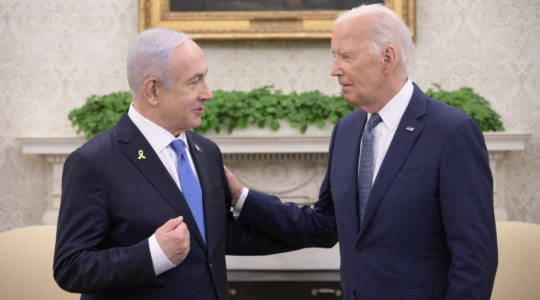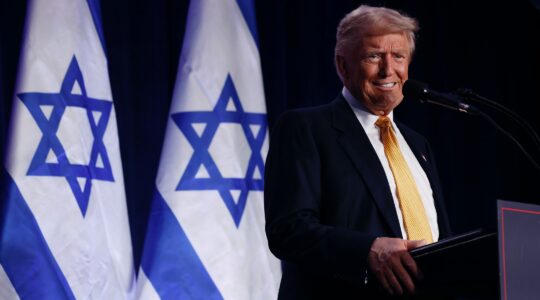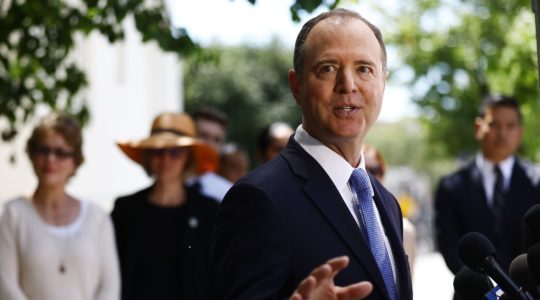JERUSALEM (JTA) – After seven lean years in Israeli-Palestinian relations, Israel, the United States and moderate Palestinians are moving to create a new dynamic.
As part of the latest initiative, Israel will ease its control of the West Bank, the Palestinians will guarantee security and the United States will provide an umbrella for talks on a final peace deal.
In a meeting Monday in Jerusalem, Prime Minister Ehud Olmert and Palestinian President Mahmoud Abbas agreed to accelerate peace talks.
Several hours later, in a clearly coordinated move, President Bush issued a major policy statement in Washington, calling for a regional peace conference to help the parties “move forward on a successful path toward a Palestinian state.”
Bush promised $190 million in American aid, $228 million in loans and $80 million to beef up Palestinian security forces being trained by U.S. Gen. Keith Dayton. He also announced plans for an international conference in the fall.
It has been a long time since the key players have shown such determination to move ahead.
Still, making progress could be difficult because of the split in Palestinian ranks. The move comes a month after Hamas took control of Gaza and Abbas established an emergency government, essentially splitting the Palestinian polity.
To demonstrate that Abbas will not be able deliver without them, radical Hamas fundamentalists may try to launch a new wave of terror from the West Bank against Israeli targets. If they do, peacemaking could become virtually impossible.
In his meeting with the Palestinian president, Olmert announced a string of goodwill gestures designed to strengthen Abbas’ position on the Palestinian street. Israel will free 250 Palestinian prisoners, mainly from Abbas’ Fatah movement; it will allow Naif Hawatmeh, the Damascus-based leader of the secular Democratic Front for the Liberation of Palestine, to enter the West Bank; and it will stop hunting a list of 180 wanted men from the Fatah-affiliated al-Aqsa Brigades. The idea is to unite the main secular groups, Fatah, the Popular Front and the Democratic Front behind Abbas.
Olmert reiterated Israel’s demand that Abbas do all he can to clamp down on terror and establish a single Palestinian armed force responsible for law and order. And he warned that if Fatah tried to patch up its differences with Hamas and re-establish a joint government with the radicals, Israel would break off the peace talks.
For his part, Abbas called for accelerated talks on a final peace agreement through public and secret channels. Unless there was a concerted effort to reach a deal, all Israel’s gestures would be meaningless, he said. Olmert retorted that it is still premature to focus on core issues, like final borders, Jerusalem and refugees, and Abbas first needed to demonstrate control over the West Bank.
Indeed, the Palestinian moderates are concerned that rather than seek a peace deal with them that would entail withdrawal from the territories, as well as “painful compromises” on Jerusalem and the refugee issue, Israel may be tempted to seek a long-term cease-fire, or hudna, with the radicals that would leave the status quo intact.
“That will not stand,” Saeb Erakat, the chief moderate Palestinian negotiator warned immediately after the Olmert-Abbas meeting.
A compromise the Israelis are working on entails a second disengagement from the West Bank. But unlike the unilateral disengagement from Gaza and a few areas of the West Bank two years ago, this time it would be with Palestinian consent and coordination.
According to the plan, being drafted by minister without portfolio Haim Ramon, Israel would withdraw from 70 percent of the West Bank – and only then start talking about the core issues. Given Hamas’ control of Gaza, Israeli officials argue that this is the only realistic game in town.
In the past, Abbas repeatedly failed to meet Israel’s minimum conditions for serious dialogue, so much so that former Prime Minister Ariel Sharon once called him a “chick without feathers.” This time, though, there are signs that things could be different.
In the wake of Israel’s amnesty for the wanted men, most have handed in their weapons to Abbas’ central Palestinian Authority. Many will be incorporated into the official Palestinian security force, which would then be strong enough to maintain law and order in the West Bank and keep Hamas in check, the thinking goes.
If Abbas is able to create what he calls “one gun,” a single Palestinian armed force capable of eradicating terror against Israel, Olmert will be able to lift roadblocks, take Israeli forces out of Palestinian cities and enable a much greater degree of freedom of movement in the West Bank.
Al-Aqsa fighters who handed in their weapons claim to be in favor of the one-gun idea, at least for now.
“There are no more rifles on the streets,” said Zakaria Zbeidia, a former al-Aqsa Brigades leader in Jenin. “We want a political solution with Israel, and we will wait a few months to see what happens.”
In his policy speech, Bush threw America’s considerable weight behind Abbas and his prime minister, Salaam Fayyad.
In addition to the $270 million in American aid, he promised the $228 million in loans.
The diplomatic effort would include a major regional conference this autumn in the Middle East to be chaired by the United States. Bush did not say specifically which countries would be invited or attend. He called on Arab states to end their refusal to recognize Israel ahead of the conference.
Bush also made demands of Olmert’s government, saying he agreed with the prime minister that Israel’s future does not lay in the “continuing occupation of the West Bank.” He called on Israel to remove settlement outposts in the West Bank, cease settlement expansion and continue transferring Palestinian tax revenues to the Palestinian Authority. “Israelis should find other practical ways to reduce their footprint without reducing their security,” Bush said, “so they can help President Abbas improve economic and humanitarian conditions.”
In addition, Bush seemed to take steps to balance his previous assurances to Israel that it would be able to keep some of the land it captured in the Six-Day War in 1967. He said that any changes to the pre-1967 borders would need to be negotiated between the parties and “guarantee that a Palestinian state is viable and contiguous.”
On the other side, Bush said the Palestinians should take steps to bolster Israel’s security.
“The Palestinian government must arrest terrorists, dismantle their infrastructure and confiscate illegal weapons,” he said.
More than that, Bush made clear that the United States would be ready to help press for a final peace deal, as the Palestinians are demanding of Israel. But there was a caveat: The Palestinians will have to choose between statehood and terror.
In other words, there would have to be quiet before the road to statehood opens up.
“With proper foundations, we can soon begin negotiations on the establishment of a Palestinian state,” Bush declared.
“America,” he said, “is prepared to lead discussions to resolve these issues.”
Bush apparently has been convinced by U.S. Secretary of State Condoleezza Rice that the Abbas-Fayyad team makes peacemaking possible in a way it has not been for the past seven years. Indeed, the emergence of the moderates on the Palestinian side paves the way for what is seen as a more “even-handed” American approach to the Israeli-Palestinian conflict.
Whereas Bush told the Palestinians to choose between terror and statehood, he urged Israel to leave the West Bank and focus on developing the Negev and the Galilee.
In other words, if the Palestinians keep their end of the bargain, the United States will help them in their quest for statehood. The regional conference Bush called for is intended to do just that. If all goes according to plan Israel, the Palestinians and moderate Arab states will attend and Rice will chair.
The aim will be to “review the progress that has been made toward building Palestinian institutions,” Bush said, and help clear the way to Palestinian statehood.
With this move, the president is gambling on a weak Palestinian leader who has not delivered on any of his promises in the past. But, then again, Abbas has never received this kind of American backing before. Will it be enough to end the seven-year diplomatic drought, or will Hamas again be able to reverse the peace dynamic?
The months leading up to the planned conference in the fall will be crucial.

Help ensure Jewish news remains accessible to all. Your donation to the Jewish Telegraphic Agency powers the trusted journalism that has connected Jewish communities worldwide for more than 100 years. With your help, JTA can continue to deliver vital news and insights. Donate today.





